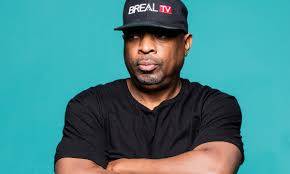Chuck D, born Carlton Douglas Ridenhour on August 1, 1960, in Queens, New York City, is an influential American rapper, author, and activist best known as the frontman of the groundbreaking hip-hop group Public Enemy. Renowned for his powerful voice and politically charged lyrics, Chuck D has played a pivotal role in shaping the direction of hip-hop, addressing social issues and advocating for racial equality.
Early Life
Chuck D was raised in a middle-class family in the politically active neighborhood of Flushing, Queens. His mother was a civil rights activist, which exposed him to issues of social justice from an early age. He attended Adelphi University in New York, where he studied graphic design and visual arts. During his college years, Chuck became increasingly involved in hip-hop culture and began to develop his skills as a rapper and lyricist.
In the early 1980s, he began his career as a rapper, initially working as a DJ and forming a group called Spectrum City with his friends. It was during this time that he met his future collaborators, including producer Hank Shocklee, who would play a crucial role in shaping the sound of Public Enemy.
Formation of Public Enemy
In 1985, Chuck D formed Public Enemy with Flavor Flav, Terminator X, and the Bomb Squad production team. The group’s debut album, Yo! Bum Rush the Show, was released in 1987 and marked the arrival of a new force in hip-hop. The album showcased Chuck D’s deep, commanding voice and politically charged lyrics, which addressed issues such as racism, inequality, and the struggles faced by African Americans.
Public Enemy’s sophomore album, It Takes a Nation of Millions to Hold Us Back (1988), is widely regarded as one of the greatest hip-hop albums of all time. The album featured classic tracks such as “Fight the Power†and “Bring the Noise,†which solidified Chuck D’s reputation as a socially conscious lyricist. The group’s innovative sound, characterized by dense sampling and layered production, combined with Chuck D’s potent delivery, resonated with audiences and set a new standard for hip-hop.
Activism and Influence
Chuck D’s lyrics often tackled controversial topics, addressing issues of race, class, and media representation. His call for social change and his unyielding stance against systemic oppression made him a prominent voice in the hip-hop community and beyond. He often urged listeners to engage in political activism and promote awareness of social injustices.
The single “Fight the Power†became an anthem for the civil rights movement and was prominently featured in Spike Lee’s film Do the Right Thing. Chuck D’s collaboration with other artists, including collaborations with artists like Anthrax and Ice Cube, showcased his versatility and commitment to bridging genres.
Later Career and Legacy
Public Enemy continued to release successful albums throughout the 1990s and 2000s, including Fear of a Black Planet (1990) and Apocalypse 91… The Enemy Strikes Black (1991). Despite experiencing some commercial ups and downs, Chuck D remained an influential figure in hip-hop and a vocal advocate for social justice.
In addition to his work with Public Enemy, Chuck D has pursued various solo projects and collaborations. He released his solo album, The Autobiography of Mistachuck, in 1996, which explored personal themes and continued his exploration of social issues. He has also worked as a producer, authored books, and contributed to various media platforms, including his radio show, And You Don’t Stop, which focuses on hip-hop culture and history.
Personal Life
Chuck D has been open about his personal life and experiences, discussing his struggles and triumphs as an artist. He has been a prominent figure in advocating for artists’ rights and has spoken about the importance of ownership and independence in the music industry.
Chuck D is married and has children, and he often emphasizes the significance of family and community in his life. His commitment to social justice extends beyond his music; he has been involved in various initiatives aimed at empowering young people and promoting education.
Conclusion
Chuck D’s impact on hip-hop and popular culture is undeniable. As the leader of Public Enemy, he has used his platform to address social issues, challenge the status quo, and inspire generations of artists and activists. His powerful lyrics, coupled with his relentless advocacy for justice and equality, have solidified his legacy as one of the most influential figures in hip-hop history.
Through his music, activism, and commitment to social change, Chuck D continues to resonate with audiences around the world, reminding us of the power of art as a tool for change. His contributions to hip-hop have left an indelible mark, ensuring that his voice will be heard for years to come.




No comments yet
Be the first to share your thoughts!